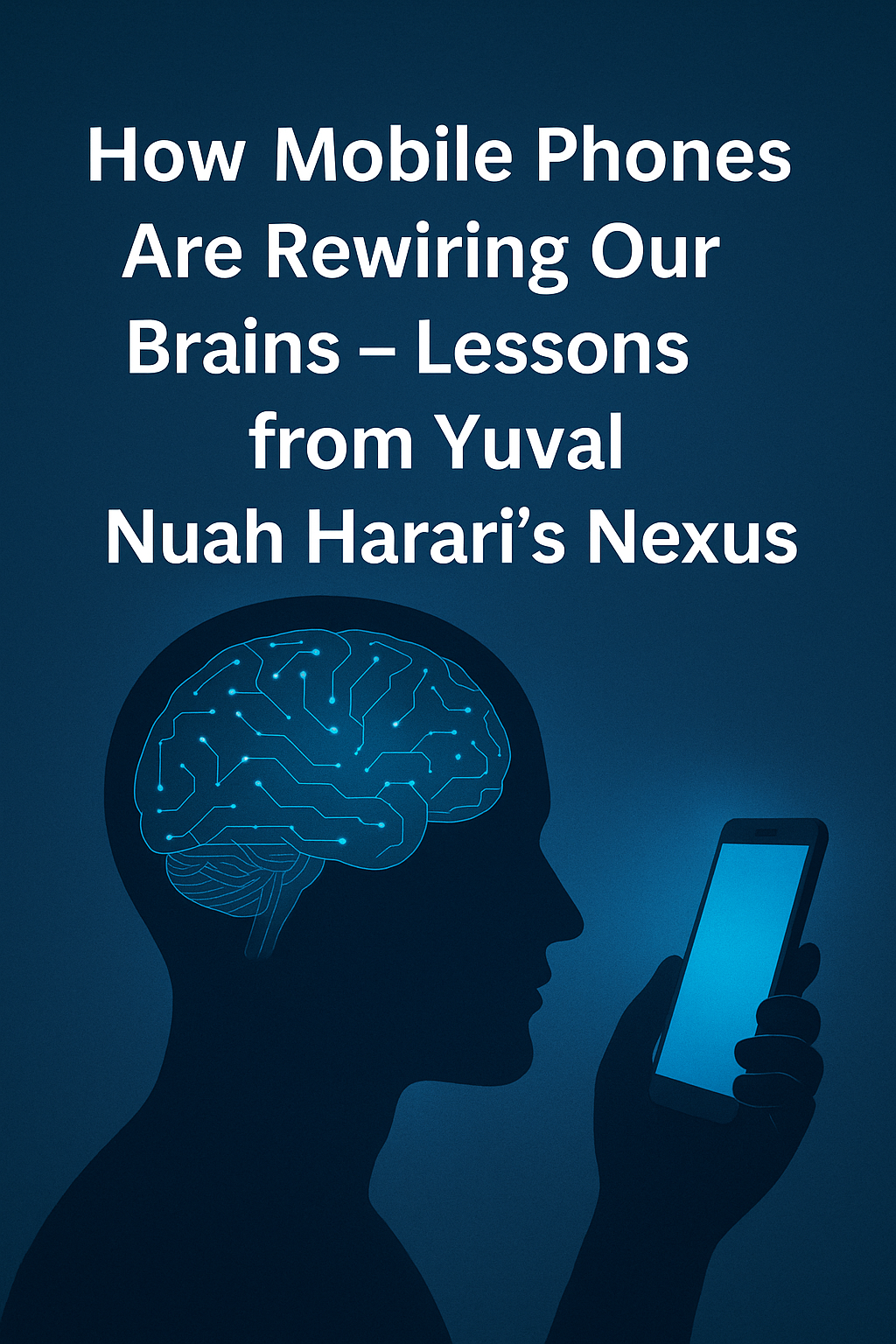How Mobile Phones Are Rewiring Our Brains – Lessons from Yuval Noah Harari’s Nexus
In today’s world, our smartphones are always within arm’s reach. They wake us up, guide our routes, entertain us, and even listen in on our conversations. But in Nexus: A Brief History of Information Networks from the Stone Age to AI, Yuval Noah Harari presents a powerful warning: our devices may be changing us more than we realize.
Harari’s book isn’t about smartphones alone—but it does address how digital networks are silently shaping human behavior. And in 2025, mobile phone addiction is no longer a fringe concern—it’s a mainstream psychological reality.
The Rise of the Inorganic Network
Harari introduces the idea of the “inorganic network”—a system powered by algorithms, digital infrastructure, and artificial intelligence. Unlike earlier human networks based on speech, storytelling, and shared memory, inorganic networks don’t sleep, forget, or forgive.
Smartphones are our gateway into this network. Harari suggests that our constant connection is conditioning us to think in short bursts, seek instant gratification, and avoid moments of silence—changes that are deeply reshaping our brains and behaviors.
Mobile Phone Addiction: A Silent Epidemic
Studies show that the average person checks their phone almost 100 times a day. This isn’t just about convenience—it’s about compulsion. Harari explains that our brains are being rewired by the very systems we’ve created.
Social media apps, messaging platforms, news alerts, and even step counters use dopamine-triggering mechanisms to keep us hooked. These apps exploit basic human psychology—reward, fear of missing out (FOMO), and social validation—to ensure we keep scrolling.
This constant loop of engagement isn’t just distracting—it’s damaging. It affects sleep, focus, emotional regulation, and even self-worth.
Smartphones and the Attention Economy
Harari draws a bold conclusion in Nexus: your attention is now the world’s most valuable resource. In the digital economy, the more time you spend online, the more profitable you are for tech companies.
Notifications are not just reminders—they’re hooks. Every buzz and banner is a pull into an ecosystem built to monetize your time. The result is a population less able to concentrate, more anxious, and often unaware of how manipulated they are.
Relationships in a Digital Fog
One of the most human costs of smartphone usage is the erosion of real human interaction. Harari emphasizes that our devices may be weakening the very social fabric that makes human cooperation possible.
Think of how often families eat in silence while scrolling. How many friendships are reduced to filtered images and typed updates? Harari warns that this kind of interaction—filtered, curated, distracted—can’t replace face-to-face presence, and we’re only beginning to understand the long-term emotional effects.
Smartphone Usage and the Decline of Trust
In Nexus, Harari explores how the digital ecosystem fuels misinformation, polarization, and paranoia. When people spend more time online than in their communities, the result is often a decline in social trust.
Echo chambers form. Algorithms push extreme views. What begins as a harmless scroll can turn into radicalization or deep insecurity. Our phones, Harari notes, have become both a mirror and a megaphone for the worst parts of the internet—and we’re absorbing it all, often without realizing.
Regaining Control in a Digital Age
Despite the bleak outlook, Harari doesn’t advocate abandoning technology. He insists that awareness and boundaries are the first steps toward a healthier digital life.
Here are a few tips inspired by Nexus:
1. Track Your Usage
Use built-in screen time tools to see how much time you spend on different apps. Awareness creates accountability.
2. Designate No-Phone Zones
Create physical spaces—like bedrooms or dining tables—where phones are not allowed. These areas help your brain recharge.
3. Rebuild Human Connections
Prioritize real-world interactions. Texting is convenient, but nothing replaces a genuine conversation or shared moment.
4. Audit Your Apps
Ask yourself: which apps serve me, and which ones use me? Delete or mute anything that drains more than it gives.
Final Thoughts
Yuval Noah Harari’s Nexus serves as a crucial reminder: we built the digital world, but now it’s reshaping us. Mobile phone addiction isn’t just about screen time—it’s about mental freedom, human connection, and the future of consciousness.
At RemedyTalks.com, we believe that healing isn’t just about medication or diet—it’s also about reclaiming your attention, peace, and presence. As Nexus shows, the future will belong to those who can navigate technology without losing themselves in it.
